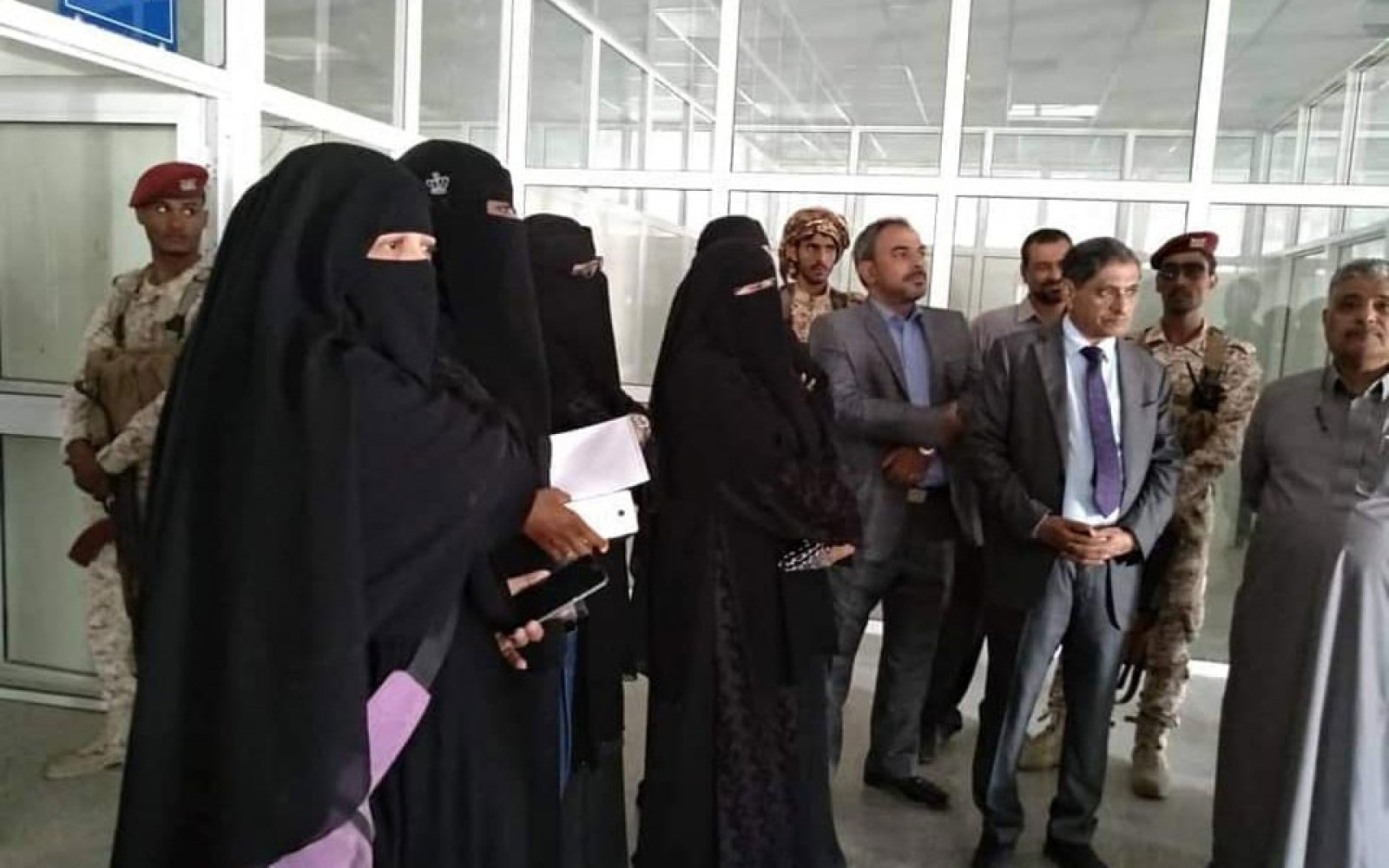
The Hadhramaut women’s peacebuilding group meeting with the Director General of the Al-Riyyan airport in January 2019.
SHARE
The civil war in Yemen has been labeled the worst humanitarian crisis in the world. According to the UN’s Office for Humanitarian Affairs (OCHA), 24 million of Yemen’s 29 million people are in immediate need of humanitarian assistance. Still, despite the difficulties, women peacebuilders in Yemen are working tirelessly to alleviate the suffering of their communities.
Yemeni citizens lack access to medical supplies and foodstuffs and do not have freedom of movement throughout the country or internationally. The conflict between the internationally recognized government and Ansar Allah (also called “Houthis”) forces has left entire areas of the country isolated and deprived of basic necessities.
The Al-Riyyan International Airport in the coastal city of Mukalla (the capital of the Hadhramaut governorate) was closed in April 2015 after Al Qaeda in the Arabian Peninsula (AQAP) overtook the city. Despite the city’s liberation from AQAP the following year, the airport and the eastern Dhuba road remained closed. Without access to the airport, citizens in Mukalla have to travel over 200 miles on hazardous roads to the airport in Sayoun. For patients with severe medical conditions, this journey is dangerous or impossible.
“The case of my son was critical and he required oxygen all the time. Doctors could not diagnose his disease and we had to travel to Egypt for treatment,” said a Yemeni woman from Mukalla, which was 200 miles from the nearest open airport. “On the way to Sayoun, he passed away.”
yemen_women_peacebuiders.jpg

Women’s groups in the Taiz, Hadhramaut, and Marib governorates have been pressuring local officials and leaders to re-open humanitarian corridors and airports, and to raise awareness of the dangers of child recruitment into the military. In April, the women’s group in Hadhramaut achieved a groundbreaking success when local authorities announced that the Al-Riyyan airport would be officially re-opened. “This accomplishment demonstrates the potential for women’s empowerment and successful grassroots organization in the midst of conflict”, said Les Campbell, Regional Director of the Middle East North Africa program at NDI.
Over the past year, NDI has provided technical and financial support to the women’s peacebuilding team in Mukalla as they designed, launched and completed their advocacy campaign to re-open the Al-Riyyan airport. Their campaign followed a two-pronged approach: holding meetings with key stakeholders and decision-makers to apply pressure to re-open the airport, and utilizing creative means to raise community awareness and generate public support for the campaign’s initiative.
In January after four months of advocacy, the governor of Hadhramaut accompanied the peacebuilding team on a field visit to the Al-Riyyan airport. This visit was covered by local media and television stations, and broadcast widely on social media. “Through networking and advocacy, the [women’s group] was able to convey their demands to local government representatives and decision-makers in a peaceful manner...these women deserve to occupy senior leadership positions,” said the deputy governor for youth affairs in Hadhramaut.
During the closing ceremony of the advocacy campaign a member of the Hadhramaut women’s group proclaimed, “We were able to prove that women can make a difference. We have successfully achieved the goals we had when we started the project and will continue to address various community priority issues.”
Simultaneously, the women’s group utilized art and community gatherings as a medium for awareness-raising and advocacy. They produced a short stop-motion animation film titled “The Longest Way to Our Dreams”, which portrays a young girl who suffers a life-altering car crash and is unable to seek medical attention due to the airport’s closure. As a result, she loses the ability to walk and is confined to a wheelchair.
Throughout their campaign period, the women’s group also held community gatherings in Hadhramaut where people affected by the road and airport closures could gather and share their stories. The women’s group compiled ten of these personal accounts into a booklet called “Unforgettable.” Populated with stories, children’s drawings and poems, the booklet is a human depiction of the suffering caused by the conflict in Yemen. The women’s group printed and distributed the booklet to thousands of key stakeholders throughout Hadhramaut, including English translations for international organizations such as OXFAM and CARE International. “In addition to generating national and international attention, this initiative was also a form of community healing and solidarity for the people of Hadhramaut”, said Jeffrey England, Deputy Regional Director of the Middle East North Africa team at NDI.
In addition to their work as community activists, several of NDI’s women peacebuilding partners have achieved national-level recognition by assisting in the mediation of prisoner exchanges between the warring parties and serving on the advisory council to UN Special Envoy Martin Griffiths.
In a final culmination of the women’s group’s advocacy efforts, the governor of Hadhramaut directed all airport staff and personnel to resume their positions starting on April 21. The airport schedule consists of a weekly flight from Mukalla to Socotra, an island off the coast of Mukalla, and to Aden, the recognized capital of the government led by Abd Rabu Mansur Hadi. There will also be international flights to Cairo, Amman and Muscat beginning in June.


